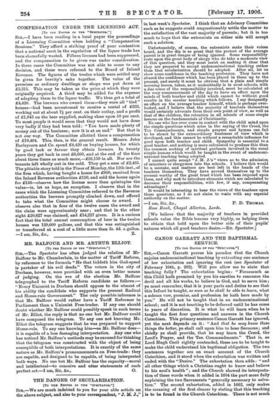MR. BALFOUR AND MR. ARTHUR ELLIOT.
[To THE EDITOIG OP THE "SPECTATOR."] Sin,—The Spectator has often judged the relation of Mr. Balfour to Mr. Chamberlain, in the matter of Tariff Reform, by reference to the formula "He that biddeth him God-speed is partaker of his evil deeds." The voters in the city of Durham, however, were provided with an even better means of judging. On the eve of the election Mr. Balfour telegraphed to the Tariff Reform candidate as follows :— "Every Unionist in Durham should oppose to the utmost of his ability the candidate who supports the present Radical and Home-rule Government." The only possible inference is that Mr. Balfour would rather have a Tariff Reformer in Parliament than a Unionist Free-trader. If any one should doubt whether Mr. Balfour could possibly speak in such terms of Mr. Elliot, the reply is that no one but Mr. Balfour could have composed the telegram. To any one not knowing Mr. Elliot the telegram suggests that he was prepared to support Home-rule. To any one knowing him—as Mr. Balfour does— it is capable of a less damaging interpretation. Any one who has noticed Mr. Balfour's methods may be excused for thinking that the telegram was constructed with the object of being susceptible of both interpretations. It is exactly of the same nature as Mr. Balfour's pronouncements on Free-trade: they are capable, and designed to be capable, of being interpreted both ways. No one but Mr. Balfour has the capacity—moral and intellectual—to conceive and utter statements of such










































 Previous page
Previous page